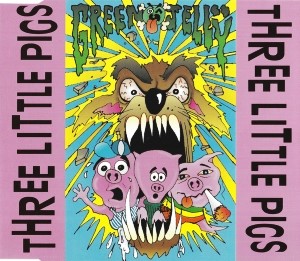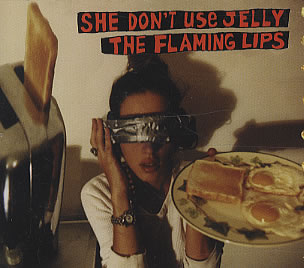
A metal umlaut is a diacritic that is sometimes used gratuitously or decoratively over letters in the names of mainly hard rock or heavy metal bands—for example, those of Blue Öyster Cult, Queensrÿche, Motörhead, the Accüsed, Mötley Crüe and the parody bands Spın̈al Tap and Green Jellÿ.

"Anarchy in the U.K." is a song by English punk rock band the Sex Pistols. It was released as the band's debut single on 26 November 1976 and was later featured on their album Never Mind the Bollocks, Here's the Sex Pistols. "Anarchy in the U.K." was number 56 on Rolling Stone magazine's list of the 500 Greatest Songs of All Time and is included in the Rock and Roll Hall of Fame's 500 Songs That Shaped Rock and Roll.
Creature often refers to:

Green Jellÿ is an American comedy rock band formed in 1981. Originally named Green Jellö, the band changed its name due to legal pressure from Kraft Foods Inc., the owners of the Jell-O brand, who claimed that it was an infringement of their trademark.

Blue Murder were an English hard rock band led by guitarist-vocalist John Sykes. The group was formed in 1987 following Sykes's dismissal from Whitesnake. The initial line-up was rounded out by bassist Tony Franklin and drummer Carmine Appice. In its nascent stage, vocalist Ray Gillen and drummer Cozy Powell were attached to the project. In 1989, Blue Murder released their self-titled debut album, which cracked the Billboard 200 chart and spawned a minor hit with "Jelly Roll". Nevertheless, the record proved to be a financial disappointment for both the band and their label Geffen Records.

"Three Little Pigs" is a song by American comedy rock band Green Jellÿ from their first video album, Cereal Killer (1992). Released by Zoo Entertainment in 1992 with the original band name, Green Jellö, the single was re-released on May 24, 1993, under the name Green Jellÿ due to a lawsuit for trademark infringement by the owners of Jell-O.
Comedy rock is rock music that is comedic in nature. It is often mixed with satire or irony.

Blue Murder is the debut album by English hard rock band Blue Murder, released on 24 April 1989 by Geffen Records. It was produced by Bob Rock. The band was formed by guitarist John Sykes after his dismissal from Whitesnake. He was eventually joined by bassist Tony Franklin and drummer Carmine Appice. The band entered Little Mountain Sound Studios in early 1988 to begin recording their debut album. After several unsuccessful attempts at finding a lead singer, John Sykes took up the role, having already sung the band's first demos. Following the record's release, Blue Murder embarked on tours supporting Bon Jovi and Billy Squier.

Edmond Enright, known professionally as Mundy, is an Irish singer-songwriter and founder of the independent record label Camcor Records.

John Richard Lomax was an English guitarist and singer-songwriter. He is best known for his association with George Harrison, who produced Lomax's recordings for the Beatles' Apple record label in the late 1960s.
Business as usual may refer to:

"She Don't Use Jelly" is a song by American rock band the Flaming Lips from their sixth studio album, Transmissions from the Satellite Heart (1993). It reached number 55 on the US Billboard Hot 100 and became a top-30 hit in Australia.
Graham Thomas Bell was an English pop and rock singer. He was the lead vocalist for the band Every Which Way, which recorded one album in 1970.
Lost Horizon is a fantasy adventure novel by James Hilton.

Jason Bradley DeFord, known professionally as Jelly Roll, is an American rapper, singer, and songwriter. Beginning his career in 2003, he rose to mainstream prominence following the release of his 2022 singles "Son of a Sinner" and "Need a Favor".

Soft Play are an English punk rock duo formed by Isaac Holman and Laurie Vincent in Royal Tunbridge Wells in 2012. They were known as Slaves until 2022, when they changed their name due to their original name's unwanted connotations.

"Guava Jelly" is a song recorded by the Jamaican group Bob Marley and the Wailers. It was released as a 7" vinyl single through Tuff Gong and Green Door Records. It was issued commercially with B-side track "Redder Then Red", which was misspelled on its initial printing, in 1971. It was written and produced by Marley and features uncredited lyrical contributions from Bunny Livingston. A reggae composition like the majority of Marley's works, "Guava Jelly" contains a rocksteady and island-like production with lyrics loosely based around sexual intercourse. His use of the term "guava jelly" was likely referring to a specific type of sexual lubricant. It was favorably viewed by several reviewers, with many of them finding the composition to be sexual and about love. The group placed "Guava Jelly" on several compilation albums, including Africa Unite: The Singles Collection in 2005, and Owen Gray and Herbie Mann created their own versions in 1974 and 1975, respectively.
Royal jelly is a substance secreted by honey bees to aid in the development of immature or young bees.
This page is based on this
Wikipedia article Text is available under the
CC BY-SA 4.0 license; additional terms may apply.
Images, videos and audio are available under their respective licenses.











